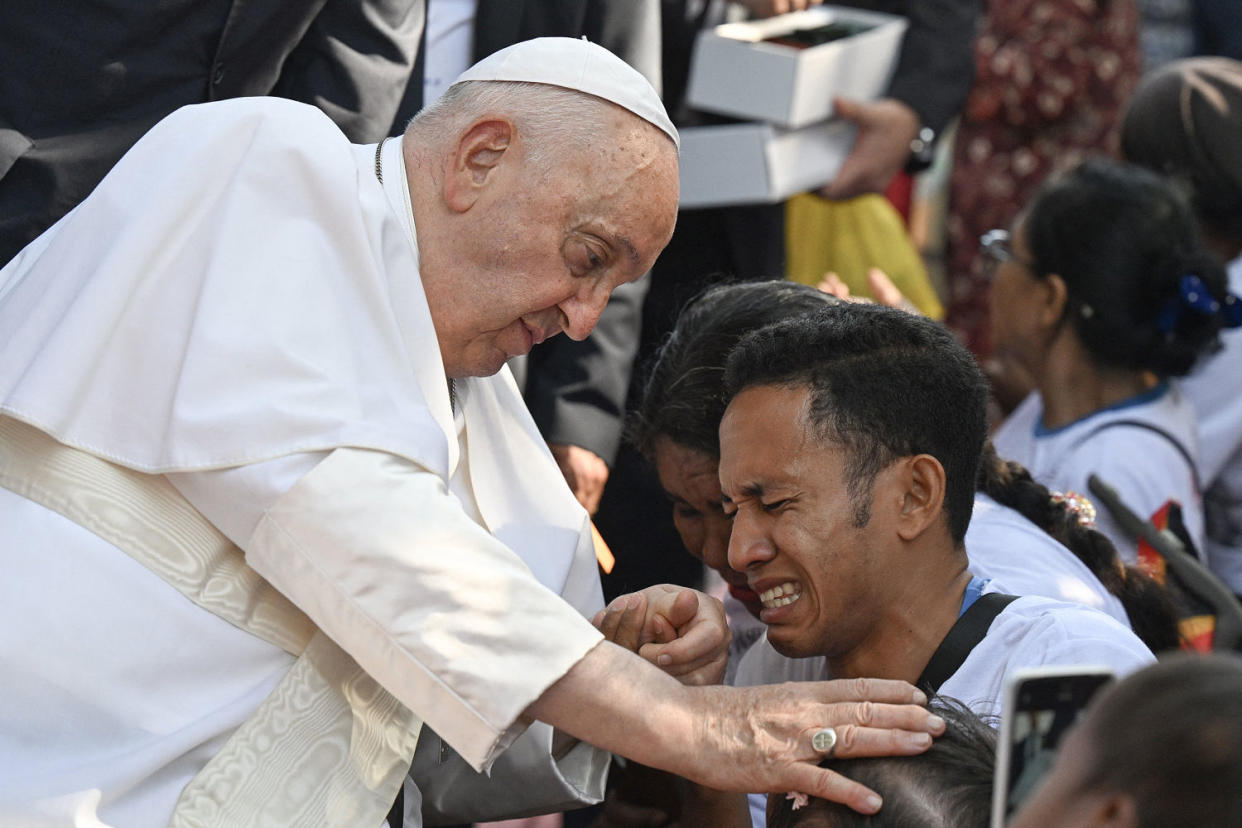Almost half the population turned out for Pope Francis' Mass in the most Catholic country outside Vatican City

Almost half the population of East Timor, the most Catholic nation outside Vatican City, attended a Mass presided over by Pope Francis on Tuesday on the third leg of his Asia trip.
An estimated 600,000 people packed the seaside park of Tasitolu near the capital, Dili, the Vatican told reporters, citing local authorities.
Some 98% of the Southeast Asian country of 1.3 million people is Catholic, and the church is seen as having played a critical role in its fight for independence from Indonesia. But the Vatican has also admitted it concealed sexual abuse by members of the clergy in East Timor, including key figures in the independence movement.
Francis, 87, is the first pope to visit East Timor since it became an independent state in 2002. It is the only Catholic-majority nation on his ambitious 12-day Asia trip, which is also taking him to Indonesia, Papua New Guinea and Singapore.
A sea of yellow and white umbrellas, the colors of the Holy See, covered the park on Tuesday as the crowd waited for Francis to arrive in the scorching afternoon sun. Firefighters occasionally sprayed water on the crowd, some of whom had been waiting since the early hours of the morning, to alleviate them from the heat.
Francis arrived shortly after 4 p.m. local time (3 a.m. ET) to cheers of “Viva Papa Francisco!”
“Our country is poor, we need more development, we need international support and the blessing of Pope Francis,” Juse Manuel Mendez told NBC News while walking with his family to the Mass.
The Mass was held at the same site where St. John Paul II, the last pope to visit East Timor, celebrated a historic liturgy in 1989. The park, which was once known as a place where Indonesian troops disposed of bodies during their violent 24-year occupation, has a large statue of John Paul honoring that visit.
Earlier Tuesday, Francis visited children with disabilities and met with bishops, priests, deacons and others at the Cathedral of the Immaculate Conception in Dili, where he gave a speech.
He arrived in the country on Monday to an enthusiastic welcome, with people jamming his motorcade route into town from the airport.

Catholicism as a ‘nationalist act’
Only about a quarter of people in East Timor were Catholic in 1975, when Indonesia invaded the country shortly after it unilaterally declared independence from centuries of Portuguese colonial rule.
Indonesia rejected the animist beliefs of the Timorese and required individuals to choose a monotheistic religion. Converting to Catholicism thus became a “nationalist act” against Muslim-majority Indonesia, said Michael Leach, a professor of politics and international relations at the Swinburne University of Technology in Australia.
The church “provided a sense of sanctuary to the Timorese in a difficult period of their history,” he said in an email.
John Paul’s high-profile visit in 1989 was a “signal moment” in the Timorese struggle for self-determination, as it appeared to symbolically recognize East Timor as a nation separate from Indonesia, Leach said.
The protests that broke out immediately after John Paul’s Mass “could not be hidden from the rest of the world,” he said.
Ten years later, 78.5% of the population voted for independence in a U.N.-backed referendum. In response, pro-Indonesia militias launched a three-week campaign that resulted in mass violence and destruction of infrastructure.
About 200,000 people are estimated to have been killed during Indonesia’s rule.

A legacy of abuse
The Vatican’s image in East Timor has also been tainted by multiple clergy abuse scandals.
In 2022, the Vatican confirmed that Dili Bishop Carlos Ximenes Belo had been secretly sanctioned two years earlier for sexually abusing young boys. Belo, who was awarded the Nobel Peace Prize in 1996 with current President Jose Ramos-Horta for their efforts to peacefully resolve the East Timor conflict, now lives in Portugal and is prohibited by the church from any contact with his former home.
In 2021, a court in East Timor sentenced former American missionary Richard Daschbach, who was widely praised for saving lives during the nation’s independence fight, to 12 years in prison for molesting young girls under his care.
“The child sex abuse cases in East Timor have been very poorly handled and left a bitter taste for many,” said Damien Kingsbury, an emeritus professor at Deakin University in Australia who has extensive experience in East Timor.
“There has been the usual inaction and cover-ups, with few cases being prosecuted, often late and following much public pressure,” he said in an email.
Francis hinted at the abuse cases in his Monday speech but did not mention Belo or others by name or acknowledge any responsibility by the church.
“Let us not forget the many children and adolescents whose dignity has been violated,” he said.
“We are all called to do everything possible to prevent every kind of abuse and guarantee a healthy and peaceful childhood for all young people.”
Francis will leave East Timor on Wednesday and continue on to Singapore, the last stop of his trip, where three-quarters of the population is ethnically Chinese. There he will have the chance to send an indirect message to Catholics in China as the Vatican tries to improve relations with Beijing.
This article was originally published on NBCNews.com
